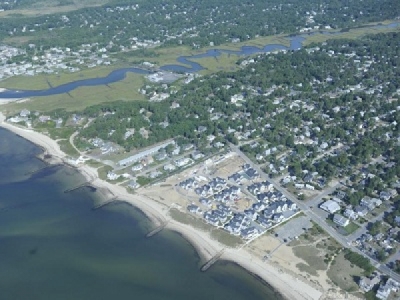
Posted on March 15, 2018
By Kristen Young, Cape Cod Times
As local officials struggle to contend with increasing erosion at many Cape beaches, the town of Dennis has asked the state’s highest court to reconsider whether sand from its dredging projects must be used to replenish a private beach.
“We have 19 public beaches, 4.5 miles of seashore that we have to deal with, and we have a limited amount of sand, a limited amount of money. How do we prioritize those resources to benefit the environment as a whole to the best that we can?” Gregg Corbo, attorney for the town, asked Massachusetts Supreme Judicial Court justices during a hearing Friday.
The town has appealed a January 2017 Barnstable Superior Court ruling that sand dredged from the mouth of Swan River must occasionally be deposited on a private Nantucket Sound beach owned by the Miramar Park Association.
The 30-member association sued the town in 2014, arguing that, when the town extended a jetty at the mouth of Swan River in the 1990s, it triggered a Department of Environmental Protection regulation requiring it to dredge occasionally and use spoils of the dredging to replenish beaches adjacent to or downdrift of the jetty, according to high court documents.
The suit alleged that the town violated the regulation when it used sand from a 2014 dredging to replenish West Dennis Beach, updrift of the jetty, instead of Miramar Beach, which is downdrift. The suit also asked that the town be prevented from dredging the mouth of Swan River unless all sand from future dredgings was deposited on Miramar Beach.
Superior Court Judge Cornelius Moriarty ruled in favor of the association in 2017, saying the town must continue to nourish Miramar Beach occasionally, but he stopped short of requiring that all sand from future dredgings be deposited there, documents show.
In his argument Friday, Corbo said Moriarty’s ruling was incorrect because the 1990s extension of the jetty did not trigger the environmental regulation.
“My understanding is that the regulation does not say that it applies to repairs,” he said, adding that the jetty originally was constructed in the 1930s, well before the regulation was written.
Because there are no existing permits or orders of conditions for the 1990s project, a lack of evidence should have prevented Moriarty from making a ruling in the first place, Corbo said.
Supreme Judicial Court justices also questioned whether Moriarty ruled without sufficient evidence.
“If we don’t have the order of conditions or the permit, or any of the backup information on that, and if the judge below didn’t have that information, how would it have been possible for the judge to have come to any conclusion?” Associate Justice Kimberly S. Budd asked.
“It’s our position that it’s not possible, that that was the error that the judge made,” Corbo replied. “The judge was bound to consider the facts in the record and not to rely on speculation or unsupported assertions or conclusions, but he made a leap here.”
Brian Wall, attorney for Miramar Park Association, argued that simply by touching the jetty, the town triggered the regulation.
“The town became involved. The town modified that jetty. The regulation that we’re talking about therefore created an affirmative and ongoing obligation on the town’s part,” he said, adding that the town acknowledged its obligation when it deposited dredged sand at Miramar Beach in 1996 but failed to do so after subsequent dredgings.
Corbo said because the regulation required only occasional nourishment of affected beaches, the town would be in compliance even if the rule was triggered.
“If the regulation is applicable, the town periodically complied. Not only has it provided nourishment to Miramar beach in the past, its 10-year dredge plan demonstrates that going forward it’s going to continue to dredge the river and it’s going to continue to provide nourishment to downdrift beaches,” he said.
Dennis, which is working to carry out the 10-year plan, should be allowed to rely on the expertise of its staff and state agencies to determine where dredged sand should be placed, Corbo said.
But Wall argued that the requirement to occasionally deposit sand on Miramar Beach would not stop the town from also replenishing public beaches.
“The town does not have to put all of the sand from Swan River on Miramar Beach, only some of it, and so it has discretion to use the other spoils as it determines,” he said.
The Supreme Judicial Court typically issues decisions within 130 days of hearing oral arguments, according to its website.
Source: Cape Cod Times





